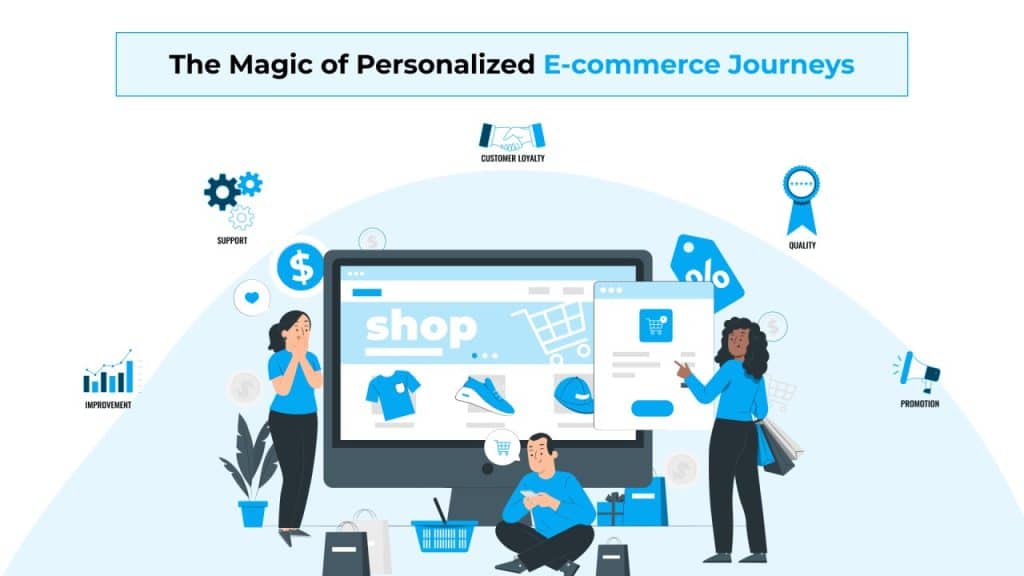In the rapidly evolving landscape of ecommerce, personalization algorithms have emerged as the linchpin for delivering tailored shopping experiences to consumers. By leveraging data-driven insights and machine learning capabilities, these algorithms have the power to revolutionize how online stores interact with their customers.
From personalized product recommendations to customized marketing messages, the impact of these algorithms is undeniable. But how exactly do they work their magic, and what implications do they hold for the future of online shopping experiences? Let’s explore the intricate world of personalization in ecommerce and unravel the secrets behind their success.
Enhancing User Experience with eCommerce Personalization
Effective eCommerce personalization hinges on understanding customer behavior, preferences, and past interactions.
By tailoring product recommendations, personalized content, and offers, businesses can create a more engaging and relevant shopping experience.
Ultimately, enhancing user experience through personalization can lead to increased customer satisfaction and loyalty.
Key Components of Effective eCommerce Personalization
To ensure successful eCommerce personalization, it is crucial to establish clear metrics that can effectively measure the impact of personalization efforts on user experience and overall business goals.
These metrics provide valuable insights into the effectiveness of personalized strategies, enabling businesses to make data-driven decisions to enhance customer engagement and drive conversions.
Metrics to Measure Personalization Success
How can we accurately measure the success of personalization in ecommerce to enhance user experience?
Key metrics include:
- Conversion rates
- Average order value
- Customer lifetime value
- Click-through rates on personalized recommendations
Tracking these metrics allows businesses to gauge the effectiveness of their personalization strategies and make data-driven decisions to continuously improve the user experience, increase engagement, and drive sales.
The Evolution of Personalization in Online Shopping
The evolution of personalization in online shopping has revolutionized the way consumers interact with eCommerce platforms.
Leveraging data for personalized shopping experiences has become a cornerstone of successful online retailers.
This evolution signifies a shift towards more tailored and individualized customer interactions in the digital marketplace.
Leveraging Data for Personalized Shopping Experiences
Personalization in ecommerce has become a cornerstone for enhancing customer loyalty and retention. By leveraging data effectively, online retailers can create tailored shopping experiences that resonate with individual preferences and behaviors.
This evolution marks a significant shift towards building stronger relationships with customers through personalized interactions.
Personalization: Enhancing Customer Loyalty and Retention
Elevating customer loyalty and retention through tailored shopping experiences has become a pivotal strategy in the realm of online commerce. Personalization techniques such as targeted recommendations and customized promotions create a unique bond between customers and brands.

Personalization Algorithms: Transforming eCommerce
In the realm of digital commerce, algorithms designed for personalization are revolutionizing the way online businesses interact with their customers. These sophisticated algorithms are transforming eCommerce by enabling companies to provide tailored shopping experiences based on individual preferences, behaviors, and past interactions with their platforms. By leveraging vast amounts of data, personalization algorithms can analyze customer demographics, purchase history, browsing patterns, and social media activity to deliver highly relevant product recommendations and targeted promotions.
One of the key ways in which personalization algorithms are reshaping eCommerce is through dynamic website content. Instead of presenting all users with the same generic homepage or product listings, these algorithms enable websites to adapt in real-time based on each visitor’s unique characteristics. For example, a returning customer may see personalized product suggestions or exclusive offers tailored to their previous purchases, while a new visitor might be shown popular items or items frequently bought together by similar customers.
Moreover, personalization algorithms are enhancing the overall shopping experience by streamlining the search process. By understanding individual preferences, these algorithms can prioritize search results, suggest relevant filters, and even offer autocomplete suggestions based on past behavior. This level of customization not only saves customers time but also increases the likelihood of them finding products that truly resonate with their needs and preferences.
The Impact of Personalized Recommendations in Online Stores
Personalized recommendations in online stores significantly enhance the customer shopping experience by providing tailored suggestions based on individual preferences and behavior.
These recommendations, powered by sophisticated AI algorithms, help increase customer engagement, drive sales, and foster brand loyalty.
The impact of personalized recommendations underscores the importance of leveraging technology to create a more personalized and seamless shopping journey for consumers.
The Role of AI in eCommerce Personalization
The impact of personalized recommendations in online stores is profound, especially in tailoring product discovery for individual customers.
AI plays a crucial role in analyzing customer data and behavior to suggest relevant products, enhancing the overall shopping experience.
Tailoring Product Discovery in eCommerce
Effective tailoring of product discovery in the realm of eCommerce involves leveraging advanced algorithms to provide customers with personalized recommendations that enhance their shopping experience and drive engagement.
By analyzing customer behavior, preferences, and past purchases, AI-powered systems can suggest relevant products, increasing the likelihood of conversion.
These personalized recommendations create a more tailored shopping experience, leading to higher customer satisfaction and loyalty.
Strategies for Implementing Personalization in eCommerce
Implementing personalization in eCommerce begins with understanding customer behavior. By analyzing data on past purchases, preferences, and browsing habits, businesses can tailor their strategies to meet individual needs.
This targeted approach enhances customer satisfaction and boosts sales.
Understanding Customer Behavior through Personalization
To effectively implement personalization in eCommerce, understanding customer behavior is crucial. By analyzing data and tracking customer interactions, businesses can tailor their strategies to meet individual preferences.
Overcoming challenges in personalization implementation requires a deep understanding of customer behavior and the ability to translate insights into actionable steps for a more personalized shopping experience.
Overcoming Challenges in Personalization Implementation
Navigating the intricacies of customer behavior to enhance personalization in eCommerce presents a multifaceted challenge that requires strategic and analytical approaches.
Overcoming challenges in personalization implementation involves leveraging data analytics, AI-driven algorithms, and machine learning to interpret customer preferences accurately.
Additionally, establishing robust data privacy measures and ensuring transparency in personalization efforts are crucial for building trust with customers and mitigating potential risks.

Conclusion
In conclusion, personalization algorithms play a crucial role in creating tailored shopping experiences for consumers in the ecommerce industry.
By utilizing data and machine learning techniques, online stores can provide personalized recommendations and content to enhance user engagement and satisfaction.
Implementing effective strategies for personalization can significantly impact customer retention and loyalty, ultimately leading to increased sales and revenue for businesses.
How Do Personalization Algorithms Handle Sensitive Customer Data Such as Payment Information and Personal Preferences?
Personalization algorithms must prioritize security measures to handle sensitive customer data like payment details and personal preferences. Utilizing encryption, access controls, and regular security assessments are essential to safeguarding this information from unauthorized access or breaches.
How Do Personalization Algorithms Take Into Account a Customer’s Offline Shopping Behavior?
Incorporating offline shopping behavior into personalization algorithms involves analyzing purchases made in physical stores, loyalty program data, and interactions with customer service representatives. This data is then integrated to enhance online shopping recommendations and experiences.
Can Personalization Algorithms Predict Future Shopping Trends and Preferences for Individual Customers?
Predicting future shopping trends and preferences for individual customers requires sophisticated data analysis and machine learning. By leveraging historical data, behavior patterns, and predictive modeling, personalization algorithms can anticipate customer needs and tailor shopping experiences accordingly.


